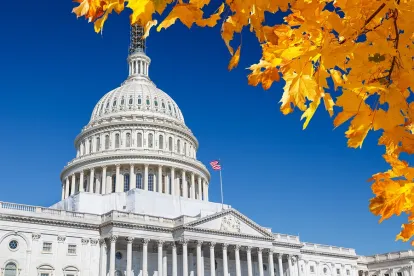Chilly Climate in D.C. Just like the bit of autumn chill that descended upon Washington, D.C., this week, congressional negotiations over a new pandemic relief package have cooled. A compromise legislative effort announced this week by the bipartisan Problem Solvers Caucus was not particularly well-received by leaders in both parties who now appear more focused on preventing another government shutdown at the end of the month.
DOL Revises FFCRA Regs. Several weeks ago, the United States District Court for the Southern District of New York invalidated key provisions of the U.S. Department of Labor’s (DOL) Families First Coronavirus Response Act’s (FFCRA) implementing regulations. While there is still time for the DOL to appeal the decision, the agency issued a new temporary rule on September 16, 2020, in order to address the ongoing uncertainty created by the court’s decision. As explained in greater detail by Burton D. Garland, Jr. and Charles L. Thompson, IV, the revised rule reaffirms some portions of the original rule (e.g., paid leave is available only where the employer has work available for the employee) while modifying other portions of the rule (e.g., the definition of “health care provider” has been limited).
House Dems Seek NLRB Joint-Employer Rule Documents. As the federal government and business groups evaluate their next steps after a federal court in New York struck down the DOL’s joint-employer rule, Democratic members of the U.S. House of Representatives this week continued their scrutiny of the National Labor Relations Board’s (NLRB) handling of the joint-employer issue. In a press release responding to a subpoena from House Democrats, the Board stated that it has “historically denied disclosure of [these] types of internal documents” because “disclosure of these pre-decisional documents would discourage agency employees from providing candid advice and undermine the internal deliberations of the Board.” Whatever the legal outcome, it is clear that the joint-employer issue will continue to remain a major policy issue in Washington, D.C.
NLRB Contract Bar Comment Extension.Speaking of the NLRB, the Board this week extended the time for the public to submit amicus briefs on whether it should amend its “contract bar” doctrine, which prohibits representation elections during the life of a collective bargaining agreement for up to three years. Amicus briefs are now due by October 7, 2020.
Federal Contractor Update. Federal contractors may want to be aware of two items that recently issued from the Office of Federal Contract Compliance Programs (OFCCP):
-
On September 11, 2020, OFCCP published a Corporate Scheduling Announcement List of federal contractors and subcontractors that have been selected for compliance evaluations. For more details, and to see if you have made the list, check out Scott Kelly’s article here.
-
On September 14, 2020, OFCCP, pursuant to the Paperwork Reduction Act of 1995, filed an information collection request seeking “authorization for an annual Affirmative Action Program [AAP] online certification process for federal contractors and for a secure method for federal contractors to submit AAPs electronically to OFCCP when they are scheduled for a compliance evaluation.” Written comments are due by November 13, 2020.
FMLA Comment Deadline. September 15, 2020, was the deadline for stakeholders to submit comments to the DOL’s Wage and Hour Division’s Request for Information (RFI) “regarding the regulations implementing the Family and Medical Leave Act of 1993 (FMLA or the Act).” The RFI requested, among other matters, information on the challenges employers and employees experience “applying the regulatory definition of a serious health condition,” “when an employee takes FMLA leave on an intermittent basis,” and “when employees request leave or notify their employers of their need for leave.”
Rayburn’s Anniversary. Eighty years ago this week, on September 16, 1940, the U.S. House of Representatives elected Samuel Taliaferro Rayburn of Texas to serve as Speaker of the House in the 76th United States Congress. The 24-term former congressman holds the record for longest tenure as Speaker, serving over 17 nonconsecutive years. Rayburn’s legislative accomplishments include helping to obtain $1.6 billion to fund the Manhattan Project, shepherding through landmark bills establishing the federal interstate highway system, the Federal Aviation Administration, and the National Aeronautics and Space Administration, and helping secure statehood for Hawaii and Alaska. Considering Rayburn’s lasting legislative legacy, it’s a shame that one of Washington, D.C.’s worst office buildings—described as the “ugliest and poorest planned public building in the United States”—bears his name.




 />i
/>i